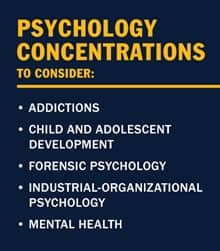Should You Become a Psychology Major? Information to Help You Decide

Understanding the numbers
When reviewing job growth and salary information, it’s important to remember that actual numbers can vary due to many different factors—like years of experience in the role, industry of employment, geographic location, worker skill and economic conditions. Cited projections are based on Bureau of Labor Statistics data, not on SNHU graduate outcomes, and do not guarantee actual salary or job growth.
Majoring in psychology can not only be personally rewarding, but it can prepare you for a variety of careers. Beyond the human services field, a psychology major can prepare you for jobs in business, education, government and roles that require a deep understanding of people and how they interact with one another.

Students often choose to major in psychology because they want to help others. However, it’s important not to narrowly define what that means, said Dr. Barbara Lesniak, executive director of social science programs at Southern New Hampshire University (SNHU).
Students with a bachelor’s degree in psychology may be able to get non-licensed entry-level roles where they can support people in settings such as substance abuse clinics, social services agencies or schools, according to Lesniak.
Lesniak noted that graduates can also use the skills earned with a degree in the business sector, in areas like "human resources or training/development or in customer-focused positions where they might deal with difficult situations that need to be de-escalated."
Outside of academia, Lesniak has over 15 years of experience designing web-based courses in the corporate world and providing counseling services. She holds a PsyD in Psychology and has been at SNHU for more than a decade.
A popular major, psychology is one of the top 10 undergraduate programs in the United States, according to The Princeton Review.
Lesniak refers to the psychology degree as “the utility knife” of degrees because it is useful in most job roles, such as any position that requires you to interact with people.
What Do Psychology Majors Learn?
As an undergraduate, you can expect to learn key psychological concepts, human behavior and research methods. Your classes will help you develop the critical thinking skills to communicate effectively.
More specifically, you’ll take a variety of general education courses in English, math, science and the humanities — as well as courses in your major. You’ll also be able to choose from a wide range of electives.

You may wonder, “Is psychology a hard major?”
You might find classes to be rigorous and writing-intensive, but to be successful, you must be able to write a paper and argue your point of view effectively, according to Dr. Thomas MacCarty, associate dean of social science programs at SNHU.
MacCarty, who has a PhD in Industrial-Organizational Psychology, worked as a probation and parole officer and opened a private addiction counseling practice before he entered the educational side of psychology.
At some universities, you can choose concentrations within your major to prepare you for a specific career path or graduate study. There are many types of psychology, so here's a breakdown of a few concentrations to help you learn about your options:
Addictions
Explore the nature of addiction, including behaviors like substance abuse and gambling. Learn about the evolution of these habits and their treatment while studying the biopsychology of behavior and the potential social causes of addiction.

Within this concentration, you might learn about the different types of addictions and how they affect the brain, as well as how addiction impacts underserved populations. According to MacCarty, this program will help you become more aware of ethical considerations and cultural sensitivity.
Child and Adolescent Development
Study children and teens' unique physical, social, psychological and cognitive needs. With a focus on experiential learning, you can gain real-world experience through internships, practicum, research and volunteer projects in a child-focused setting.
You might take courses that focus on the influences that shape development, childhood disorders and treatments and the role of nature vs. nurture.
Learn more about a degree in child and adolescent development.
Forensic Psychology

Apply your research skills, psychological knowledge and critical thinking abilities to a variety of issues facing the legal system to prepare for jobs that require psychological assessment, investigative research and crime analytics.
According to Dr. Patti Butterfield, an adjunct faculty member at SNHU, a forensic psychology degree can provide a deeper understanding of human behavior, which can be helpful for law enforcement officers or correctional workers. Butterfield served as a psychology services branch administrator for the Federal Bureau of Prisons, overseeing the work of over 1500 mental health professionals across the country.
During a forensic psychology program, you might take courses that analyze the root of criminal behavior and the relationship between psychology, crime and the justice system.
Learn more about a degree in forensic psychology degree.
Industrial-Organizational (I-O) Psychology
Dive into organizational development, career development and decision theory, gaining valuable insights. Explore key areas like recruitment, training and performance measurement, preparing you for human resources and organizational management roles.
This program may teach you how psychology can improve workplace effectiveness and how people's thoughts and feelings are affected by those around them. You will also have an opportunity to improve your analytical thinking skills, problem-solving skills and your understanding of workplace ethics, said MacCarty.
Learn more about a degree in I-O psychology.
Mental Health

Focus on counseling techniques and psychological assessment to position you to support people and communities in need of help.
In this program, you can expect to take courses that focus on counseling techniques, psychological tests and the relationship between psychology and society.
This degree can also help you prepare for further graduate study. For example, if you're interested in working as a mental health counselor, a bachelor's degree with a mental health focus can help you meet the educational requirements of a master's degree. According to Dr. William La Valle, an adjunct psychology instructor at SNHU, working as a mental health counselor can be rewarding to those who want to help people who are struggling.
Learn more about a degree in mental health.
Find Your Program
How Long Does it Take to Major in Psychology?
Bachelor's degrees are often referred to as "four-year degrees," but the amount of time it takes to earn a bachelor's in psychology all depends on your goals, educational background and the type of program you choose.
Online courses, for example, may provide you the flexibility to take classes that mesh well with your current schedule and lifestyle.
Once you choose your psychology program type, you'll need to consider the number of courses you want to take each term. It might be tempting to enroll in multiple courses each term to finish quicker, but it may not be feasible if you have other commitments at work or home.
If you already have college credits, you might be able to complete your degree faster. Some universities will allow you to transfer those credits toward your degree program.
For example, SNHU accepts up to 90 transfer credits toward your psychology program. Whatever program you choose, your academic advisor can help you map out a plan to best help you reach your goals.
What Jobs Can You Get By Majoring in Psychology?
While an undergraduate psychology degree alone won’t qualify you to become a licensed psychologist, it does open the door to many helping professions and entry-level roles in business.
The American Psychological Association (APA) identifies the types of jobs you may get with a psychology degree on its website.
Here are five roles a bachelor’s degree in psychology might prepare you for:
Human Resources Specialist
Human resources specialists screen, recruit, interview and place workers in job roles, according to the U.S. Bureau of Labor Statistics (BLS). They also handle complex employee relations, compensation, benefits and training. You may be well-suited for this role if you have solid interpersonal and communication skills, said BLS.
If you are interested in a position like this, consider pursuing a degree in I-O psychology.
"The education received in I-O psychology programs prepares those students extremely well to work in human resources," said MacCarty.
Human resource specialist roles are on the rise, too, according to BLS, as the role is expected to grow 6% from 2022 to 2032.* The median annual salary for the position was $67,650 in 2023, BLS reported.*
Market Research Analyst
What makes buyers favor one brand over another? Market research analysts can help organizations get a better idea by studying market conditions to examine potential product or service sales.
If you have strong math and analytical skills, this role might appeal to you, as it focuses on collecting and interpreting data related to consumer demographics, preferences, needs and buying habits, said BLS.
There continues to be a strong demand for market research analysts, as the job is expected to grow 13% from 2022 to 2032, according to BLS, which is much faster than average.* BLS also reported that market research analysts earned a median salary of $74,680 in 2023.*
Read more: What Does a Market Research Analyst Do?
Probation Officer and Correctional Treatment Specialist
Often, when an individual is released from jail or prison, they must comply with court-ordered supervision. Probation and parole officers provide guidance and help people get the resources they need to successfully reintegrate into society.
As a correctional treatment specialist, you would help probationers and parolees create and stick to rehabilitation plans, said BLS. These roles require critical thinking and decision-making skills, said BLS, along with an understanding of substance abuse.
Probation officers and correctional treatment specialists earned a median salary of $61,800 in 2023, according to the BLS, and the role is expected to grow by 3% from 2022 to 2032.*
Sales Manager
Closing a sale requires understanding your customer's needs and what it takes to overcome their objections. Sales managers can work in a variety of industries and typically set sales goals, analyze data and develop training programs for their sales representatives, according to BLS.
Sales managers earned a median salary of $135,160 in 2023, and the role is expected to grow 4% from 2022 to 2032, according to BLS.*
Read more: What Does a Sales Manager Do?
Social and Community Service Manager
Social and community service managers work for nonprofit organizations, for-profit social service companies and government agencies. For example, they may focus on providing services to children, the homeless, older adults or veterans.
As a social or community service manager, you would focus on supervising staff and volunteers who provide direct services to their clients, said BLS. You may also be responsible for collecting data, overseeing budgets or meeting with potential donors.
In 2023, social and community service managers earned a median salary of $77,030, and the roles are expected to grow 9% from 2022 to 2032, according to BLS.*
To advance your career or open doors to other professions, you might want to consider an internship.
Internships for a Psychology Major
Internships expose you to the real-world application of psychology. They can also help you understand what you encounter daily in a job. Completing an internship as part of your undergraduate psychology program can help you build valuable networks and contacts for post-graduation career searches or letters of recommendation if you decide to apply to a graduate program.
Consider completing an internship in your area of interest and working with your career advisor to find experiences that best match your career goals.
According to Handshake, popular psychology internships include research and assistant roles in community clinics, nonprofit organizations, schools or correctional facilities, for example.

Completing a bachelor’s degree in psychology can prepare you for graduate study in psychology. As you navigate the educational next steps, it helps to keep your end goal in mind, said Dr. Nickolas Dominello, senior associate dean of social science programs at SNHU. Dominello, who has a doctorate in psychology, became interested in the field as a teenager and taught high school psychology courses before transitioning to higher education.
If you want to become a mental health counselor, a school counselor or work with a specific population in the future, consider the coursework and internships that can bring you one more step closer to your goal.
After completing an internship and learning what psychology jobs most appeal to you, you might be ready to consider graduate programs. You can enter or advance in many fields with the help of a master's degree in psychology, including child and adolescent development psychology, forensic psychology or industrial-organizational psychology.
An undergraduate psychology degree can also provide a solid foundation to pursue a graduate degree in clinical mental health counseling or other fields such as social work or school counseling. (Note: SNHU is not currently enrolling new students in the graduate counseling program.)

What Can You Do With a Graduate Degree in Psychology?
A master's degree in psychology can improve your understanding of research methods, cognitive psychology, social psychology and personality, learning theory and ethical practice with an emphasis on the real-world application of psychological research.
Here are some concentrations you can specialize in as part of a master’s in psychology program and the types of jobs associated with each degree. These concentrations can position you well to pursue doctoral-level coursework and seek employment in several fields.
Master's in Child and Adolescent Development Psychology
If you pursue a master's in child and adolescent development, you'll create assessment, intervention and consultation strategies that address children's unique individual, cultural and psychological needs. You might develop, coordinate or administer childhood programming for community centers, daycares, schools and nonprofits.
If this career path interests you, see how to become a child psychologist, what jobs are out there and the skills you'll need.
Master's in Forensic Psychology
Pursuing a master's in forensic psychology can help you master the research, analysis, assessment and human behavior skills needed to apply psychology principles in the criminal justice system. With your concentration in forensic psychology, you could pursue jobs such as crime analyst, forensic case manager or jury consultant.
Want to know more? Learn how psychology, science and law unite in this career path.
Master's in Industrial-Organizational Psychology
A master's in industrial-organizational psychology can help you learn how to improve employee performance, motivation and general well-being by studying individual and group behavior in the workplace.
If you can see yourself using your psychology education to help businesses, explore what I-O psychologists do daily.
Do You Want to Become a Clinical Mental Health Counselor?
When you think of someone with a background in psychology, you may think of a professional who evaluates, treats and follows up with clients struggling with mental health issues. Only those licensed in clinical mental health counseling can provide these services to patients.
If your dream is to ultimately work as a clinical mental health counselor, an undergraduate background in psychology may be the first step toward reaching your goal — followed by a master's in clinical mental health counseling. (Note: SNHU is not currently enrolling new students in the graduate counseling program.)
A master’s degree in psychology doesn’t automatically lead to licensure as a clinical mental health counselor. Clinical mental health counseling is a specialized field that requires a prescribed course of study and skills development, along with internship hours, according to Lesniak.
Some clinical mental health counseling master’s degree programs may require you to complete a certain number of academic credits, practicum hours and internships. However, some states require additional hours for licensure.
Summing it Up
Still on the fence about whether you should major in psychology? No matter what your ultimate career or educational goals might be, a degree in psychology helps you better understand concepts, principles and theories from a scientific standpoint — skills you can apply at work and to many aspects of your life.
Education can change your life. Find the SNHU psychology program that can best help you meet your goals.
*Cited job growth projections may not reflect local and/or short-term economic or job conditions and do not guarantee actual job growth. Actual salaries and/or earning potential may be the result of a combination of factors including, but not limited to: years of experience, industry of employment, geographic location, and worker skill.
Krysten Godfrey Maddocks ’11G is a writer who covers K-12 and higher education topics, including policy and the role of digital technology in education. She spent almost a decade working in various marketing roles at an educational assessment company before launching a strategic marketing company. Maddocks earned a master's degree in marketing from Southern New Hampshire University and a bachelor's degree in English/ journalism from the University of New Hampshire. Connect with her on LinkedIn.
Explore more content like this article

How Psychology Grad Amanda Saldana Found Community as an Online Student

Academic Spotlight: Dr. Laman Tasch, Associate Dean of Academic Strategy, Social Sciences

Why Earning His BA in Political Science Mattered to Anthony Fernandez
About Southern New Hampshire University

SNHU is a nonprofit, accredited university with a mission to make high-quality education more accessible and affordable for everyone.
Founded in 1932, and online since 1995, we’ve helped countless students reach their goals with flexible, career-focused programs. Our 300-acre campus in Manchester, NH is home to over 3,000 students, and we serve over 135,000 students online. Visit our about SNHU page to learn more about our mission, accreditations, leadership team, national recognitions and awards.


